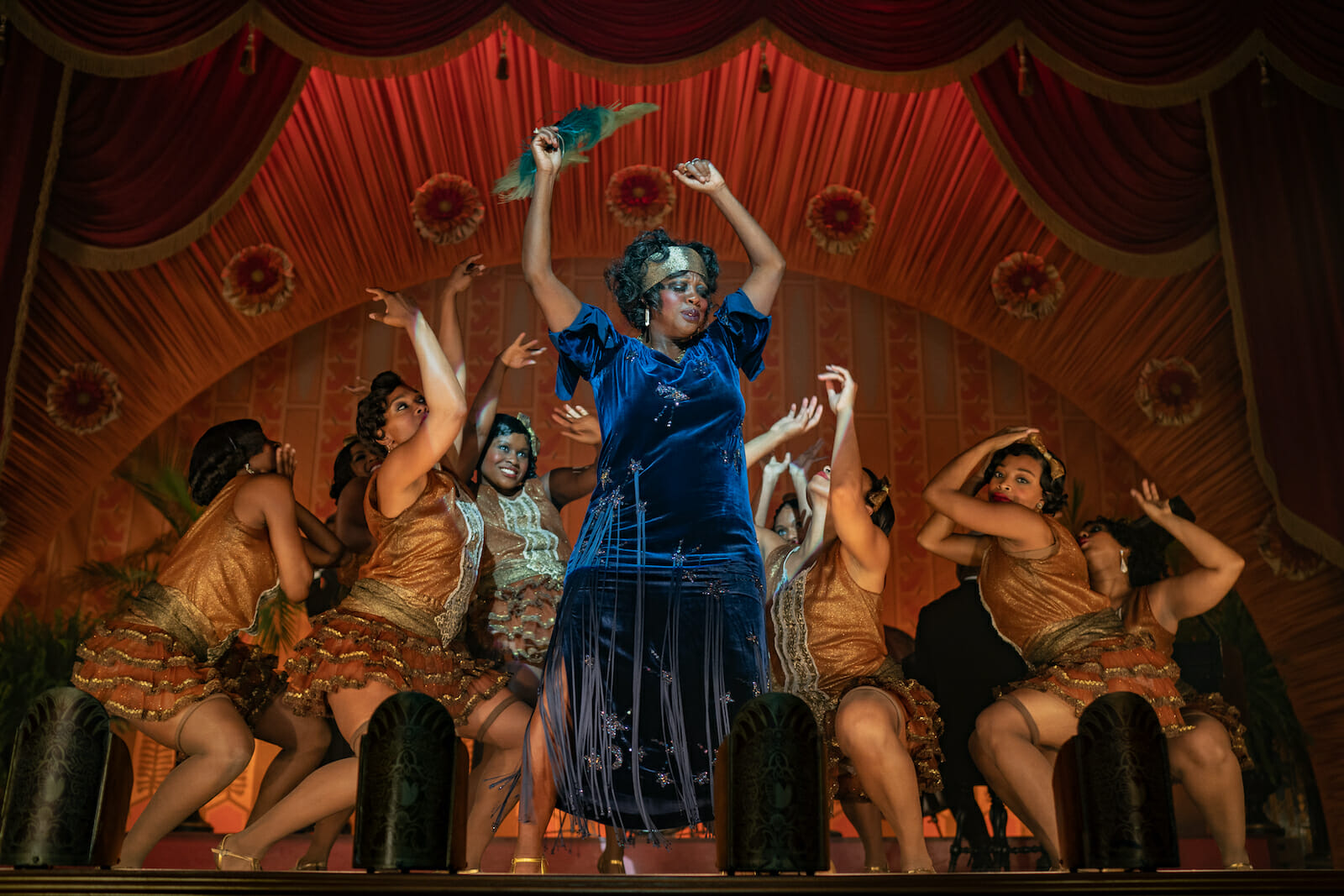
‘Ma Rainey’s Black Bottom’ Review
As an Executive Producer, Denzel Washington has pledged to bring 10 August Wilson plays (collectively known as “The Pittsburgh Cycle” or “Century Cycle”) to the cinema. The first was the Oscar-nominated Fences (2016), and George C. Wolfe directs this, the second. Ruben Santiago-Hudson has adapted Wilson’s 1984 play Ma Rainey’s Black Bottom into a feature film vehicle for some of the finest on-screen acting we will see this year.
Viola Davis (Oscar winner, Fences) stars as Gertrude “Ma” Rainey, the “Mother of Blues,” and the recently deceased Chadwick Boseman co-stars as Levee, her ambitious trumpet player. Ms. Davis delivers a towering performance, and Mr. Boseman leaves us with his career-best. The film opens in 1927 rural Georgia with two African-Americans running through the woods under the cover of darkness. If your mind goes where my mind did, we are both wrong. They are headed to a shack acting as a nightclub, and we get our first look and listen to Ma belting out a tune. It’s a powerful image and one that expertly sets the tone.
Soon we are in Chicago as Ma’s band makes their way to a recording studio. Cutler (Colman Santiago, If Beale Street Could Talk, 2018) plays the trombone and is the de facto leader, Toledo (Glynn Turman, “Fargo”) is the piano player, and Slow Drag (Michael Potts) plays the bass. The three older men all arrive on time at the studio and are waiting on trumpet player Levee (Boseman) and Ma. When Levee does show up, he struts into the rehearsal room and flashes his new shoes. The generational difference is immediately evident, and the fiery banter is superb. Levee is charming and cocky, while the older men are wise from experience and have undoubtedly seen dozens of Levees throughout their years. Cutler’s strong religious beliefs become known and Toledo’s sage advice falls on deaf ears.
Ma literally crashes into the scene, and we quickly understand that this woman will apologize for nothing, and has earned the right to call her own shots – even if that’s only true in this one corner of the universe. She understands the power her record sales give her, and she seizes every possible upper hand – whether it’s which arrangement to sing on a song, allowing her stuttering nephew to record, or even demanding a cold coca-cola before singing. Ma speaks in third person and her attitude is not that of a warm, grateful person, but rather of a woman who understands what she has earned. When she says, “All they want is my voice,” we know exactly what she means.
More collisions occur, this time figuratively. There is a collision of swagger between Ma and Levee. The collision of generations with Levee and the band. Finally, there is the collision of Levee and the white man. Ma wants to sing her songs on the record the way she sings them for her fans, while Levee is pushing for the “new” up-tempo sound. Levee’s ambition for songwriting and putting together his own band clashes with the older musicians who are satisfied to be working. Levee tries to play the game by playing up to the white men in power, only to be taught the lesson that his bandmates tried to warn him of.
Wilson is known for his speeches, and the key players get their moment. Toledo describes Blacks as “the leftovers,” while Ma describes the white people listening to the blues “they hear it come out, but they don’t know how it got there.” These are powerful moments, yet standing above them are the two soliloquies we hear from Levee. The first is about his background of family and introduction to white men, while the second is truly an other-worldly cinematic moment – he contests the unwavering religious beliefs in what ultimately proves to be the most tragic way. It’s a scene which will be Mr. Boseman’s long-lasting acting legacy.
Supporting work is provided by Jeremy Shamos as Ma’s agent Irvin, Taylour Paige as another line in the sand between Ma and Levee, Dusan Brown as Ma’s nephew, and Jonny Coyne as the studio owner/producer. This is not so much a story, but rather an inspiration for us to assemble the various pieces into the backstories of these characters. It’s a way for us to better understand what they did to get here, and how they are handling it now. Step on the shoes at your own peril. When someone overcomes so much in life, they aren’t likely to back down gently. The music is terrific, the message is strong, and the performances are unforgettable.
Ma Rainey’s Black Bottom is available on Netflix.

